 A warm welcome to author Rosemary Gemmell who describes herself as a ‘butterfly writer’ with her work covering many genres. She has published short stories, articles, poetry and children’s fiction. Her first novel, Dangerous Deceit, is a romantic intrigue set in Regency England.
A warm welcome to author Rosemary Gemmell who describes herself as a ‘butterfly writer’ with her work covering many genres. She has published short stories, articles, poetry and children’s fiction. Her first novel, Dangerous Deceit, is a romantic intrigue set in Regency England.Rosemary can you tell us how you got started?
I started writing adolescent romantic poetry at high school, in between reading as many novels as possible. Then work, marriage and children took over my life until I suddenly felt a creative urge again. When we moved house, just before my oldest started secondary school, I found a new local writing group and my creativity really took off. Winning a short story competition at an annual Scottish writing conference astounded me but gave me a little more confidence in my writing. When the late Ian Somerville of My Weekly, who had awarded me the prize, then bought the story for the magazine, I felt I was on truly on my way (but it’s been a long journey!).
To plot or not to plot? How much of a planner are you?
I absolutely cannot plot a short story or full length novel. I think it would stop me writing the story if I’d already planned it out. After deciding on the year if it’s historical, I usually have a setting and the two main characters. I do think a lot about whatever I’m working on and am convinced the subconscious takes over as I write, throwing up further characters and ideas as the story develops.
Where is your favourite place to work?
I’m fortunate in having my own work space in our extension/study. One long wall is lined with books, floor to ceiling and I have a desk and computer. The window overlooks the back garden and hills beyond. However, I do love to go to a favourite Costa in the mall where I shop one morning a week. Apart from the great coffee and cake, I seem to get more creative writing done there in half an hour than I do at home. Haven’t worked out if it’s because of the buzz, the absence of domesticity, or writing with pen and paper!
Do you write every day? What is your work schedule?
I try to write something every day, even if it’s only a blog post. My best time for new writing is to go straight to the computer after showering and dressing, taking my breakfast cereal with me. As long as I don’t get tempted into reading blogs and forums first. I have trouble settling to only one kind of writing, so I tend to flit between short stories, articles and novels – and even the novels are in different genres and age groups! It’s a wonder I get anything finished.
How do you develop your characters?
Characters are always the most important part of anything I write, so I begin with my heroine and hero, the period and an idea of the setting. I must know my characters’ names and have a good idea of their basic personalities. Then I start to write and let the characters play. I can’t imagine developing characters without seeing how they react in the situations they come up against. Although I can picture them in my mind, I don’t write anything down about them other than in the actual story. Every short story I’ve had published began with a character and a first line. We’ll see if it works so well for novels!
What is the hardest part of the writing process for you?
Self-discipline, pure and simple. It’s probably why I flit from one kind of writing to another to stop me getting bored. I sometimes achieve a lot but have to force myself to sit down and get on with the job far too often.
Do you find time to have interests other than writing?
Now that I have the luxury of concentrating on writing rather than sharing it with part-time work and children (although that brings its own problems, see above), I’m indulging my love of dancing. I’ve done belly-dancing and salsa, started zumba, and now do tap dancing once a week with other mid-life women who don’t want to give up their inner child. I’ve recently been invited to rejoin our village choir so might do that in the autumn.
What advice would you give a new writer?
Never give up trying to find your own voice and genre, by practicing different types of writing until you find the one that feels most comfortable. And then send your work out, or no one will ever get the chance to read it. A local writing group can offer superb support, friendship, and help to build confidence. And do read everything you can.
How do you promote your books?
Since this is my first novel and it’s with a Canadian publisher, in e-book first, I’ve been learning fast. I already had a blog about reading and writing for a couple of years, as a short story and article writer, where I built up a connection with other bloggers, readers and writers and regard many of them as cyber friends now. I began a new one for the romance novel and started doing the same with that long before the novel came out. I think it’s really important to leave comments on other writers’ blogs and follow those you like, as that’s how you begin to get known. I want to connect with other people, not just try to get them to buy my book! I’m also on Facebook and lots of writing forums, but resisting Twitter so far.
As soon as I had my cover image I ordered postcards from Vistaprint and I’ve been handing them out to everyone who shows the remotest interest in what I do. That’s been very successful over the last couple of weeks with some rewarding contacts – I might do a post about that to encourage others, on my reading and writing blog. I also had an all-day and evening cyber launch on my Regency blog, which was huge fun and very successful.
In what way has the RNA helped you or your career?
The RNA has meant everything to me. I don’t think I’d ever have finished any of my novels if it hadn’t been for the New Writers’ Scheme. Dangerous Deceit had a very good critique and was almost accepted by Hale right away, but then I left it aside for too many years before redrafting it a few times and submitting it to Champagne Books who accepted this stronger version. Meanwhile, I eventually completed a women’s contemporary with alternate historical chapters that also went through the NWS scheme and received a very good critique last year. That’s now being considered by an American agent (I’m an optimist).
Are you a specialist of one genre or do you have another identity?
As you’ll have gathered by now, I’m a butterfly writer and can’t for the life of me settle for long on any genre. I’m even collecting different identities! I use my full name, Rosemary, for short stories, articles and any future mainstream novels. I’m Romy for historical romance. I’ve just had my first children’s novel (10-14 age group) accepted for publication next March and I’m going to be Ros for that. I decided to keep my own surname for everything but have a slightly different identity for each genre – and I have a long first name to play with. It means that even if I have different blogs, I can connect them all through my website and reading and writing blog. I don’t want to be a completely different person, but just have a particular identity for each genre.
 Tell us about your latest book, and how you got the idea for it.
Tell us about your latest book, and how you got the idea for it.Dangerous Deceit is historical romantic intrigue set in Regency England (1813). I devouredGeorgette Heyer and Jane Austen when growing up and was always drawn to that period, although Austen outlived Heyer for me in the end. I also did OU literature and history degrees around the time I started writing seriously, so I immediately thought of trying a historical. I love suspense and intrigue rather than straight romance, so wanted to incorporate a little in this novel. As with all my writing, I started with my two characters, the year (and knowledge of the historical background) and set them on their way. All the other characters appeared as I needed them. I know it sounds simplistic, but it’s honestly the way I work! I did, however, have to think about where the characters were going to end up and how to get them there. Now I have to try and get on with the next, or perhaps I might try and finish that 16th century novel I started a few years ago!
Thank you Rosemary, and we wish you every success with Dangerous Deceit.
If you want to know more about Rosemary and her writing, visit her website
http://www.rosemarygemmell.com
Follow her blogs: http://ros-readingandwriting.blogspot.com and http://romygemmell.blogspot.com
To buy on Amazon: http://www.amazon.co.uk/Dangerous-Deceit/dp/B004YXMFHU/ref=sr_1_1?ie=UTF8&m=A3TVV12T0I6NSM&qid=1304457367&sr=1-1















































